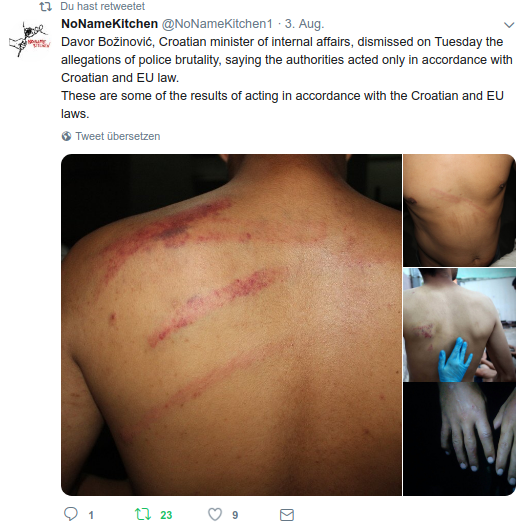Rund 7000 Geflüchtete warten in Serbien auf die Weiterreise. Sie könnten dort Asylanträge für die EU stellen, schlagen Staaten wie Österreich vor. EU-Sammelzentren in Serbien? – Das sei nicht gut fürs Land, meinen dortige Oppositionspolitiker.
Push-backs, violence and inadequate conditions at the Balkan route’s new frontier
In Bosnia and Herzegovina, a crisis is looming if the pace of coordinated humanitarian response does not pick up before temperatures begin to drop. More than 4,000 migrants and refugees are currently sheltering in informal camps and squats along Bosnia’s border with Croatia. This is a new situation for Bosnia, which before this year had not seen significant numbers of people transiting through the country as part of the so-called Balkan route. Although the stream of people arriving in the country has been rising for months, basic humanitarian conditions in the two largest points of congregation along the border remain alarmingly inadequate.
“We Too Were Refugees” – in a Bosnian Field, a Helping Hand
An hour’s drive from the Croatian town of Karlovac, down a side road lined with tombstones and houses pocked with bullet holes, there is a desolate border crossing between Croatia and Bosnia. Beyond lays Velika Kladusa, a place that seems to exist only on the map. Between 1993 and 1995 it was the capital of the self-declared Autonomous Republic of Western Bosnia, the fiefdom of Bosniak (Bosnian Muslim) businessman Fikret Abdic, known for the pacts he made with the Serbs and Croats against his fellow Bosniaks in Sarajevo during Bosnia’s 1992-95 war. Today, it is a transit point for thousands of migrants and refugees from the Middle East, Africa and Asia trying to enter the European Union via Croatia en route to Western Europe.
Konkurrenz der Notleidenden
Ein ganzer Aufgang eines Wohnblocks nahe am Belgrader Stadtzentrum wird von Flüchtlingen bevölkert. Sie stammen nicht aus Afghanistan, Pakistan, dem Irak oder Iran, wie derzeit das Gros der Migranten in Serbien, die auf der Balkanroute nicht mehr vorwärtskommen Richtung Norden, sondern festsitzen.
Refugees crossing from Bosnia ‘beaten and robbed by Croatian police’
The lucky ones escaped with only their mobile phones smashed. Those less fortunate say they were beaten with sticks, taunted or attacked with dogs. Many allege they had large sums of money stolen. According to the testimony of migrants and monitoring groups, the Croatian police force is engaging in a systematic campaign of violence and theft against migrants and refugees attempting to find a route to western Europe through the country.
Kroatischer Innenminister: Es gibt keine Gewalt

Croatian Police Accused Again of Brutality to Migrants
New reports emerged on Wednesday of the Croatian police using undue violence against migrants attempting to cross the border from Bosnia. No Name Kitchen, NNK, an NGO that helps migrants and refugees in Bosnia and Herzegovina, on Wednesday on social networks accused Croatian police of beating a migrant and documented the claim with a photograph of his injured back.
Two migrants shot dead in Serbia – police
Two migrants were shot dead on a road in Serbia near the village of Dobrinci, around 45 km (28 miles) northwest of the capital Belgrade, police said on Wednesday, giving no details of their deaths or identity. Hundreds of thousands of migrants passed through the so-called ‘Balkan route’ from the Middle East, Africa and Asia passed on their way to the West in 2015 but it was shut in 2016 when Turkey agreed to stem the flow of people in return for EU aid and a promise of visa-free travel for its own citizens.
Migrants and Refugees Find Squalor in Bosnia, Croatia Closed
It was almost lunchtime at a dormitory on the outskirts of Bihac in northwestern Bosnia and Herzegovina and an Afghan woman sheltered from the rain in a tent before joining the queue for food. The dormitory was unfinished. Its windows had no glass, the water pipes leaked and there were holes in the upper floors. The stench of smoke and urine hung in the air. “This is not a camp, and that is not food,” said the woman, who did not give her name.
Refugees on new Balkan route stuck in limbo
The camp outside of the city of Velika Kladusa in Bosnia and Herzegovina is growing every day. Its inhabitants: men, women, and children taking the new Balkan route as refugees in search of safety and security in Europe. Here their lodgings consist of improvised tents at best, but more often than not, the only “roof” over their heads is a thin plastic tarp supported by sticks. When it rains, the camp gets particularly bad: wet tents and mud everywhere. “This is not a refugee camp,” Kasim from Pakistan said. “It was good in Serbia. We had food and received clothing and good tents there. Here, we have nothing.”
